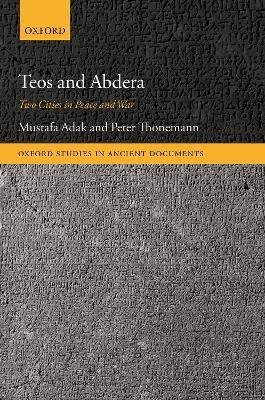Oxford Studies in Ancient Documents
1 total work
In late summer 2017, ongoing Turkish excavations at the site of Teos in Ionia uncovered one of the largest and most important Greek inscriptions to have been discovered this century. It records, in thrilling and moving detail, the assistance provided by the Teians in the repopulation and rebuilding of their daughter-city, Abdera in Thrace, after its sack by the Romans in 170 BC during the Third Macedonian War. The new text, published here for the first time, is
startling testimony to the ancestral friendship- and support-networks that existed between Greek poleis in the Hellenistic world, and includes (among other things) the longest surviving description of an honorific statue to survive from the ancient world. In the light of the new inscription, the authors
offer a full reassessment of the epigraphic and literary evidence for relations between Teos and Abdera, thereby providing a comprehensive long-term history of the two cities, from the sixth to the second century BC. The book also includes major new editions of the 'Teian Dirae' (public curses at Teos and Abdera in the early fifth century BC) and the second-century decree of Abdera for the Teian ambassadors Amymon and Megathymos, as well as two further new texts from the sanctuary of Dionysos
at Teos.
startling testimony to the ancestral friendship- and support-networks that existed between Greek poleis in the Hellenistic world, and includes (among other things) the longest surviving description of an honorific statue to survive from the ancient world. In the light of the new inscription, the authors
offer a full reassessment of the epigraphic and literary evidence for relations between Teos and Abdera, thereby providing a comprehensive long-term history of the two cities, from the sixth to the second century BC. The book also includes major new editions of the 'Teian Dirae' (public curses at Teos and Abdera in the early fifth century BC) and the second-century decree of Abdera for the Teian ambassadors Amymon and Megathymos, as well as two further new texts from the sanctuary of Dionysos
at Teos.
